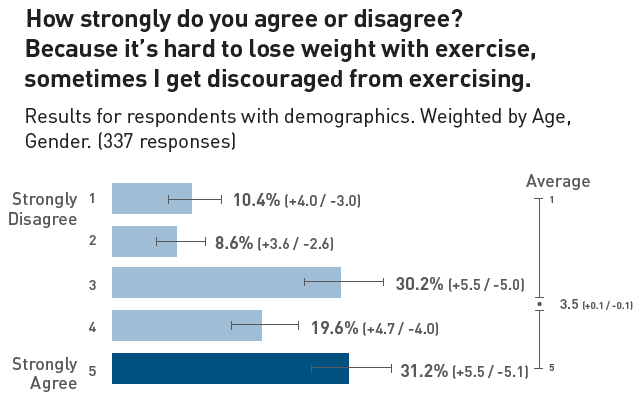
Is It Possible to Oversell Exercise?
How could it be possible to oversell exercise? The benefits for health are tremendous. Regular physical activity can help you live longer, feel better, keep diabetes and heart disease under control, put you in a better mood, and improve your sex life. But one selling point that exercise doesn’t deliver so well is weight loss.
So what? People believe it anyway. Gyms, fitness programs, and people hawking exercise equipment focus on dropping pounds as a key benefit for what they’re selling. Health and wellness writers regularly compile lists of “The Ten Best Exercises for Weight Loss.” Even the Mayo Clinic gives you tips on “Exercise for Weight Loss.”
The thing is that for losing weight, nutrition has a much bigger effect than exercise. You can certainly keep the weight off much better if you exercise, but the notion that you can sweat away the pounds through exercise is a false promise.
 False promises are poison for a brand or an idea. Ted Kyle and Diana Thomas are presenting new consumer research (funded by ConscienHealth) on this subject at the Experimental Biology meeting in Boston today. It points to the possibility that overselling the weight loss benefits of exercise may be leading people to become discouraged with exercise.
False promises are poison for a brand or an idea. Ted Kyle and Diana Thomas are presenting new consumer research (funded by ConscienHealth) on this subject at the Experimental Biology meeting in Boston today. It points to the possibility that overselling the weight loss benefits of exercise may be leading people to become discouraged with exercise.
As the first chart shows, most adults have been led (falsely) to believe that “exercise is a very effective way to lose weight.” Younger people are even more likely to believe this.
 The second chart shows that about half of all adults report getting discouraged from exercising because it’s so hard to lose weight with it. Both women and people with obesity were more likely to feel this way.
The second chart shows that about half of all adults report getting discouraged from exercising because it’s so hard to lose weight with it. Both women and people with obesity were more likely to feel this way.
But Kyle and Thomas also found evidence that people may be open to more realistic promises — that exercise is better for maintaining a healthy weight than for losing weight. Call it compliance, call it persistence, or call it loyalty to the cause of fitness. It doesn’t matter what you call it.
It will be higher if we stop overselling the benefit of exercise for weight loss.
Click here for more details of the research by Kyle and Thomas.
Wacky Workout, postcard © wackystuff / flickr
Subscribe by email to follow the accumulating evidence and observations that shape our view of health, obesity, and policy.

March 29, 2015 at 8:33 am, Joe Gitchell said:
Oh, no! I would hate to have my opinions influenced by data! How dare you?!?
New concept for you, Ted (at least it was new for me): epistemic closure (http://en.wikipedia.org/wiki/Epistemic_closure).
I fear that we’ll need to be using this ever more often…..
March 29, 2015 at 11:34 am, Ted said:
Definitely new to me, too, though I seem to bump into closed belief systems quite often. Seems like a useful concept to wrap my brain around.
March 29, 2015 at 8:34 am, Joe Gitchell said:
Oh, and good luck on your talk! Would love your slides when you can….
March 29, 2015 at 11:33 am, Ted said:
Thanks, Joe. You can get the whole story at https://conscienhealth.org/wp-content/uploads/2015/03/EB2015.pdf.
March 31, 2015 at 10:13 pm, Dr Vivek Mantri said:
There are two basic things about weight gain,always get confused, if think simultaneously,are, obesity and weight loss. Obesity is totally biochemical function,where as weight loss is diet and exercise function. I fully agree with statements made in this article, because,obesity means low BMR. (Of course there are several causes of lowering BMR like hypothyroidism, PCOD,other endocrine dysfunction etc.) Some times weight could be lost by proper exercises and proper diet. But this formula cannot be successful every time to everybody.That depends on severity of BMR. There are great chances to gain weight by just doing exercise and NOT following proper diet.Treating BMR and treating deposited fats are separate issues.
April 09, 2015 at 2:43 pm, Morgan Downey said:
Excellent job, Ted. I would only add an observation that I believe exercise is the most common weight loss recommendation by physicians. In addition, Claude Bouchard has a study showing about 8% of those using physical activity have adverse events. See http://www.downeyobesityreport.com/2012/05/study-rattles-exercise-recommendation/
April 09, 2015 at 7:14 pm, Ted said:
Wow, Morgan. Great minds think alike. Nik Dhurandhar came to me at EB and pointed out Bouchard’s study as being very relevant to this. I’m glad to have the link to your excellent discussion of this.